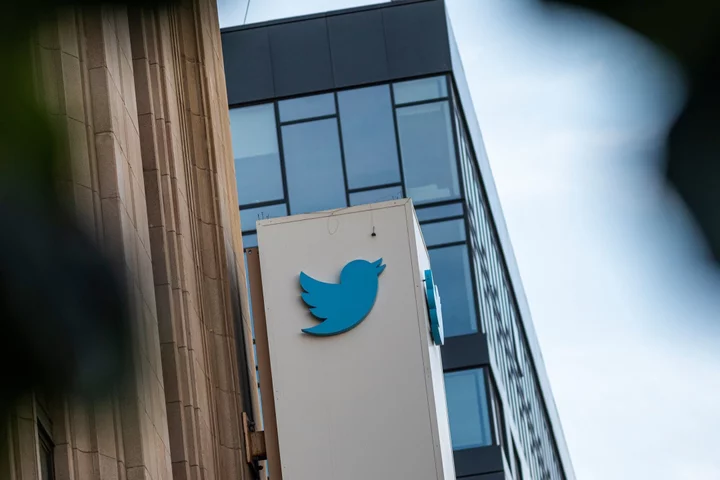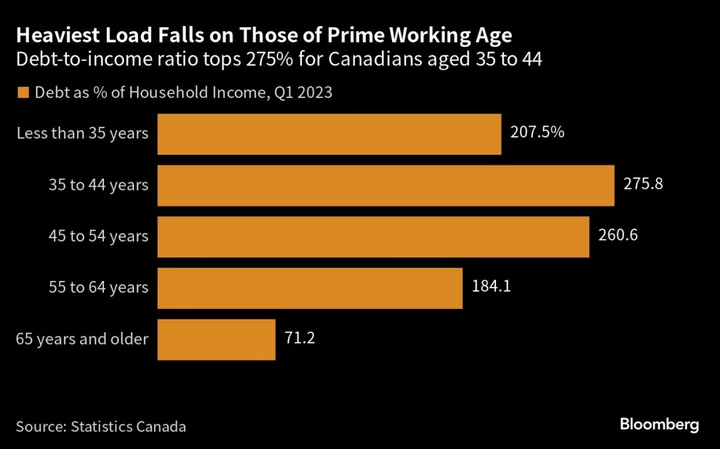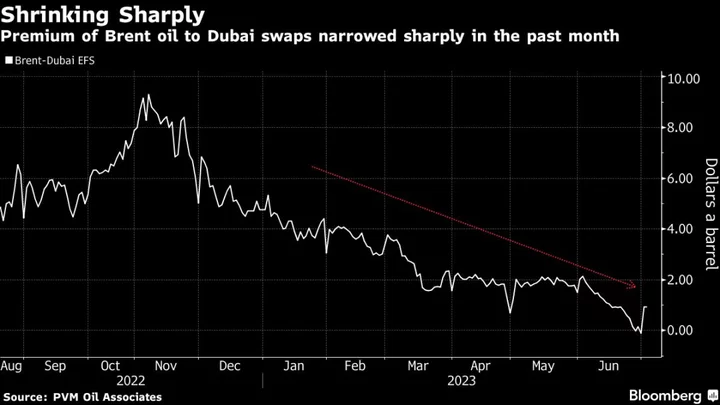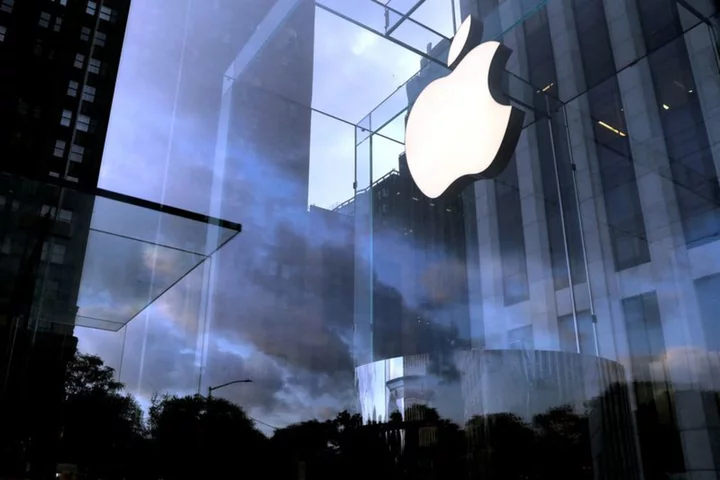
Twitter Says Ads Mostly Unaffected by Limits That Target Bots
Twitter said its temporary cap on the number of tweets that accounts can see each day has had
2023-07-05 02:47

Irish budget to deliver €5.2bn spending package
Ireland's finance minister says the budget aims to protect people from the impacts of inflation.
2023-07-05 02:47

Exclusive-Insurers look to ease UN climate alliance rules after member exodus - sources
By Tommy Wilkes LONDON (Reuters) -The remaining insurers in a United Nations-backed coalition aimed at tackling climate change are poised
2023-07-05 02:19

UK banks should not close accounts over customers' politics, minister says
By Huw Jones and David Milliken LONDON British banks should have to serve a customer even if they
2023-07-05 01:49

SBB Races to Raise Money With Real Estate Firm Stake Sale
Troubled Swedish landlord Samhallsbyggnadsbolaget i Norden AB sold its entire stake in sector peer Heba Fastighets AB in
2023-07-05 00:53

Bahrain Set to Invest £1 Billion in UK After Crown Prince Visits
Bahrain plans to invest £1 billion in the UK and will strengthen ties related to financial services as
2023-07-05 00:29

Shein in talks with banks and exchanges about U.S. IPO-sources
By Echo Wang and Anirban Sen NEW YORK China-founded online retailer Shein is working with at least three
2023-07-05 00:27

Gap Between Canada’s Rich and Poor Is Widening at Record Pace
Inflation, higher interest rates and declining real estate values are worsening wealth inequality in Canada, with younger households
2023-07-04 23:47

Saudi Oil Cuts See Top Buyers Looking at Crude From Elsewhere
Asia’s oil refiners, responsible for meeting about a third of the world’s fuel consumption, are getting ready to
2023-07-04 23:23

‘Rate limits’ and Twitter chaos: What exactly is Elon Musk doing?
Twitter has been plunged into chaos in recent days, amid new “rate limits” and rules that actually stop people from using the site. The changes have been dramatic enough that they have led to speculation that they could be the thing to finally doom Elon Musk’s takeover of the social network. What are the ‘rate limits’? It is a somewhat technical term for a complex process that has a simple effect: users are rationed on how many tweets they can see. If people and the apps they use make too many requests too often – in this case for tweets – then the service will stop providing them. On Twitter, the new rate limits are different depending on what kind of user is on: someone who pays for the premium “Twitter Blue” service will get more than a normal user, for instance. They are also changing all the time, with the limit being increased recently. Twitter has long had rate limits, which ensure that malicious actors cannot send huge number of requests to the site and bring it down, for instance. But they would previously only have been hit by people using specific tools, since they were much higher. What happens when you hit the limit? Users will see a warning telling them they have received the rate limit. The site will then stop working properly, because it will refuse to load any more tweets. Why has it happened? The official explanation is that Elon Musk is concerned about how many artificial intelligence companies are scraping posts from Twitter in order to feed to their systems and teach them more about how to use language. In an attempt to stop that, Mr Musk placed the limits to make it harder for that scraping to happen. But there is no proof that is actually the case. The problems at Twitter may well be infrastructural issues caused by the site’s engineering, and its lack of staff, that have made it incapable of serving normal requests. Or it might be a mix of the two. There is no doubt that the site is being scraped, but rate limits of this kind are an unusual way of responding to it, and other sites that are being scraped have not needed to do the same thing. Are there other changes? The other major change instituted recently by Elon Musk is to ban people who are not signed into the site from seeing posts. This is ostensibly for the same reason, since it means that scrapers cannot just gather up posts from the site from the outside. It already means that some things about Twitter are not working as they used to. If someone sends a tweet within a messaging app, for instance, then the posts’ preview won’t show, since the app cannot access the tweet. Will this change how people use Twitter? Almost certainly. Much of Twitter’s value lies in its high-profile and high-commitment users: the celebrities, organisations and big brands who use it to post, and the engaged users who follow them. That is much of what sustains its place in culture, even as it gets fewer users than much bigger social networks such as Facebook. The recent changes have directly antagonised those users. Big organisations cannot rely on tweets as a way for anyone to see what they’re posting, since users have to be logged in; engaged users cannot rely on being able to use the platform, since they are set to be rate limited. What’s more, the recent changes could cause problems for advertisers, given how important it is for users to stay engaged and see their posts. Companies are already using Twitter less for advertising, as a result of other controversies, and that may just continue. Is this the end? Some people have been predicting an end to Twitter since long before Elon Musk took it over; when he did, those predictions got louder and more regular, but they have still been largely wrong. It appears that no matter what Mr Musk does, people keep logging on and using the site. That might well be largely due to network effects: the idea that the value really comes from the number of people using the platform, which also makes it very difficult to create a new one. People might be unhappy on Twitter, but the network effect means they might feel lonely or that they are missing out if they move elsewhere. But all of that doesn’t mean that this time around won’t be the end. Certainly the latest problems have the most obviously problematic effect, of forcing Twitter’s most engaged users to not use the app, which might finally encourage them to go elsewhere. In the end, the discussion is often based on the idea that there will be some big moment that causes everyone to leave Twitter, or for the app to die. In fact, social networks have tended to decline slowly before they are finally shut down; something that might already be happening on Twitter. What are the alternatives to Twitter? Again, people have been trying to replace Twitter for years, for reasons including everything from protests against its content management rules to opposition to its centralised nature. Attempts to create a new Twitter have only increased since Elon Musk took over the original one. But they have almost always failed to take off. Network effects and the relative maturity of Twitter as a platform mean that they have always faced a challenge, and never really met it. As such there are a number of alternatives to Twitter. Notable among them are Mastodon, which is decentralised and has become perhaps the most discussed new alternative, and Bluesky, an effort to build a new kind of Twitter that originally began with the company. But the most promising alternative might be about to launch. Meta is launching Threads this week, an app linked to Instagram that aims to allow people to post text updates that might have the might to actually take over from Twitter. What is happening to TweetDeck? TweetDeck also went down along with Twitter over the weekend. It’s unclear how the two are connected, though they happened at the same time. Now Twitter has announced that TweetDeck is coming back. But it comes with some changes, and the most notable of them is that people will have to pay for Twitter Blue to get access to it. Read More Twitter to stop TweetDeck access for unverified users Meta’s Twitter alternative Threads to be launched this week How Elon Musk finally broke Twitter – and why it might just be the start Twitter rival Bluesky halts sign-ups after huge surge in demand Twitter is breaking more and more Twitter rival sees huge increase in users as Elon Musk ‘destroys his site’
2023-07-04 23:15

Apple loses London appeal in 4G patent dispute with Optis
LONDON Apple Inc infringed two telecommunications patents used in devices including iPhones and iPads, London's Court of Appeal
2023-07-04 22:29

Los Andes Copper Weighs Funding Options For Chile Project Including Sale
Los Andes Copper Ltd. is considering options to finance development of a mine in Chile, including a potential
2023-07-04 22:24
